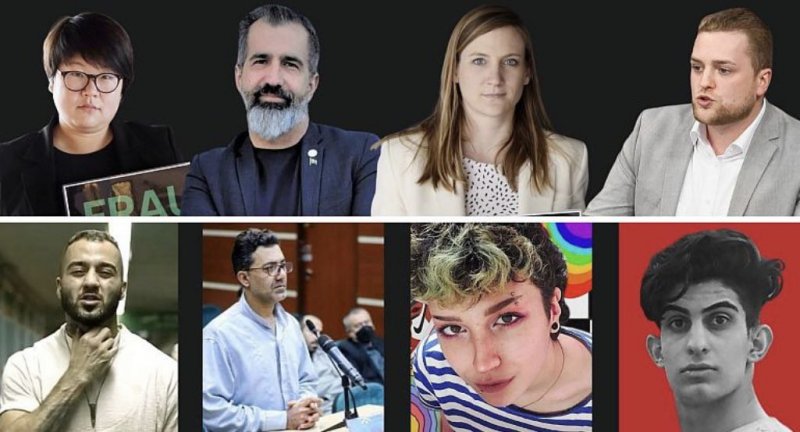Political Sponsorship: A Symbolic or Effective Move to Halt Executions
What is Political Sponsorship?
Political sponsorship is a concept meaning moral support for someone and does not include legal obligations. This legal concept was initially approved in 2003 at the proposal of the German government in the Human Rights Commission of the German Parliament. According to this law, members of this parliament can politically support members of other countries’ parliaments who are under pressure or persecution.
Although a political sponsor cannot act as a legal attorney for the person under sponsorship, they can use their political position to bring the individual’s voice to legal and international channels.
A political sponsor follows the news and situation of the person under sponsorship, uses social networks and official media to talk about the person, and can pressure the offending government’s embassy for the release of the person under sponsorship. They can also pressure their own government to negotiate about the person’s situation. However, political sponsorship is not a guarantee to prevent the execution of sentences like the death penalty, but it can be used as a method to apply pressure on the government.
Our Movement and Political Sponsorship
During the protest movement ‘Woman, Life, Freedom,’ three German parliamentarians took political sponsorship of Toomaj Salehi, Saman Yasin, and Mohammad Boroghni, who were sentenced to death on charges of ‘waging war against God.’
Martin Diedenhofen, a German parliamentarian, stated in a declaration that he is concerned about the situation of Mohammad Boroghni and all political prisoners who have been unjustly detained and tortured and are at risk of execution.
Carlos Kasper, a representative and member of the Social Democratic Party, also accepted the political sponsorship of Saman Seydi, stating that Saman was in solitary confinement with Mohsen Shekari and another detainee, and Shekari’s execution has heightened the risk for Saman.
Ye-One Rhie, a member of the SPD from Aachen in the German parliament, took political sponsorship of Toomaj Salehi. Omid Nouripour, the head of the German Green Party and member of the Bundestag, also announced in a video that he has taken political sponsorship of Toomaj Salehi.
Jytte Guteland, a Swedish parliamentarian, took political sponsorship of Milad Armon. Katja Leikert, a German parliamentarian, and Mahmoud Farahmand, a Norwegian parliamentarian, took political sponsorship of Sonia Sharifi. Helge Limburg, a member of the Bundestag, announced that he has taken political sponsorship of Mahmoud Farahmand. Additionally, Ardalan Shekarabi, a Swedish parliamentarian, tweeted that he has taken political sponsorship of Mohammad Mehdi Karami.
Halting Executions After Global Community Protests
The executions of Mohsen Shekari and Majidreza Rahnavard faced widespread reactions both inside and outside Iran, with officials and political figures from various countries, academic figures, and civil and human rights organizations expressing their strong objections to the Islamic Republic following these executions.
Among these reactions was a statement from the International Federation for Human Rights (FIDH) and the League for the Defense of Human Rights in Iran (LDDHI) on Tuesday, December 13, calling on governments worldwide, especially European Union member states, to recall their ambassadors and highest-ranking diplomats from the Islamic Republic of Iran.
The statement emphasized that keeping diplomats from other countries in Iran under the conditions of brutal suppression and the execution of two protesters in less than a week, without signs of a change in the Tehran regime’s behavior, is unjustifiable. The International Federation for Human Rights and the League for the Defense of Human Rights in Iran also called on all United Nations member countries to condemn the execution of protesters and demand an immediate halt to the use of the death penalty in Iran. These reactions by organizations and NGOs, alongside support from politicians and parliamentarians from European countries, seem to have been effective in halting or at least temporarily preventing the execution of death sentences.
In another reaction, a group of academics wrote a letter to Javaid Rehman, the UN Special Rapporteur on Human Rights in Iran, and the UN Human Rights Commission’s fact-finding committee, urging immediate action regarding the following: the cancellation of unjust and inexcusable death sentences of detainees, the cessation of various forms of torture, harassment, and inhumane confessions of detainees in temporary detention centers and prisons, and the formation of an independent non-governmental fact-finding group to impartially investigate the conditions of prisoners, including issues of torture, abuse, and sexual harassment in prisons.
The judicial processes of detainees’ trials should be transparent and public, and they should be able to enjoy all human rights to defend themselves, including the free choice of a defense attorney. The UN Human Rights Commission’s fact-finding committee should immediately put the review of detainees’ trials, especially death sentences, on its agenda.
The large volume of global reactions seems to have significantly increased the international cost of executing detained protesters in our movement to the extent that even the possibility of severing or reducing the level of diplomatic relations may be on the agenda of major Western governments due to public pressure. It remains to be seen what approach the Iranian political system will take, whether it will continue to believe in the policy of ‘victory through terror’ or will make a tactical retreat in pursuit of relative calm in diplomatic relations and somewhat in its domestic policy.

